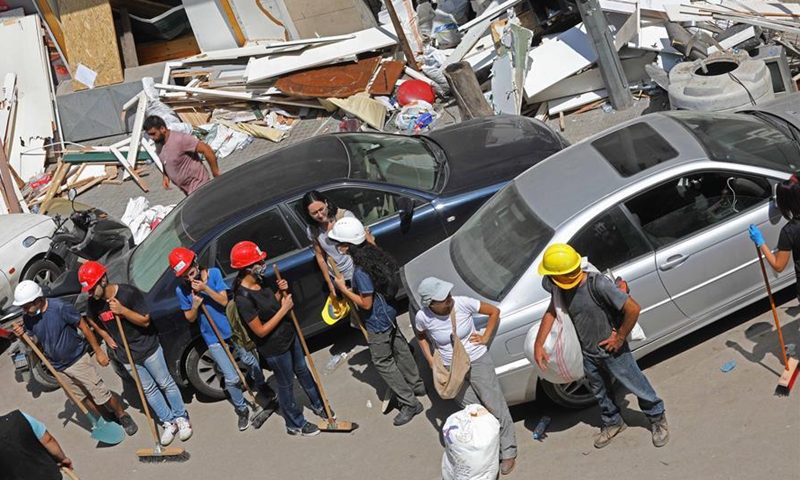Feature: Young volunteers in Lebanon gather to remove shattered glass after Beirut explosions
Source: Xinhua Published: 2020/8/8 10:26:37

Volunteers help to clean the streets in Beirut, Lebanon, on Aug. 7, 2020. (Xinhua/Bilal Jawich)
During the past two days after massive explosions rocked Lebanon's capital Beirut, young volunteers in the country gathered together to remove shattered glass from streets, while being in mourning over the death of more than 150 people.
Standing in the Gemmayze, a neighborhood that was once bustling with nightlife lovers and tourists from around the world, Wassim Kerbage, a 17-year-old volunteer, was coordinating the cleaning work.
"We are carrying our brooms to help the people affected by the explosions. We will go to their houses to clean up the rubble and broken glass," Kerbage from the Chouf district in Mount Lebanon told Xinhua.
Any crisis in any part of Lebanon affects the whole country, he noted.
Two huge blasts rocked Port of Beirut on Tuesday at around 6:10 p.m. local time (1510 GMT), killing 154 and injuring 5,000 others with dozens still missing under the rubble.
The devastating explosions shook buildings all over the Lebanese capital, some of which are now condemned as unsafe to use while others were partially destroyed and in need of rehabilitation.
Rima Abou Khzam, a member of the Union of Progressive Women, said her association is also working in tandem with Beirut's municipality to assess the damage to houses and buildings in Gemmayze, one of the most affected neighborhoods by the explosions because of its proximity to the Port of Beirut.
"When we finish statistics, we submit them to the municipality which would secure support for the people whose houses were partially or totally destroyed," Abou Khzam told Xinhua.
Benitto Moubarak, an 18-year-old student, came with his teachers and schoolmates to help clean Colleage Sacre-Coeur in Beirut and the surrounding streets.
"We have to help each other as much as possible during these tough times," Moubarak noted.
Zakaria Baba, project manager at the Development for People and Nature Association, told Xinhua that his association is working with the Lebanese National Bloc to survey people in the districts of Ashrafieh, Gemmayze and Karantina about their needs after the explosions to secure a rapid assessment of the losses and ensuing compensation.
Marwan Abboud, governor of Beirut, announced earlier that the explosions cost the city between 3 billion U.S. dollars to 5 billion dollars in material losses.
In addition, around 300,000 are estimated to have lost their houses in the explosions, according to Beirut's municipality.
Lebanese President Michel Aoun promised on Friday to start the reconstruction work as soon as possible.
Posted in: CROSS-BORDERS